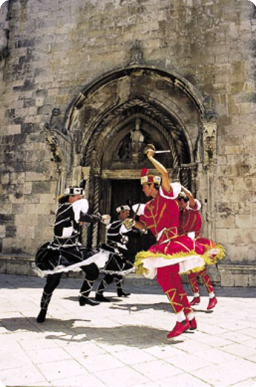

Korčula/island of Korčula
Korčula/island of Korčula  Marco Polo
Marco Polo
Marco Polo (c. 1254 – January 8, 1324) was a Christian merchant from the Venetian Republic who wrote Il Milione, which introduced Europeans to Central Asia and China. He learned about trading whilst his father and uncle, Niccolò and Maffeo, travelled through Asia and met Kublai Khan. In 1269, they returned to Venice to meet Marco for the first time. The three of them embarked on an epic journey to Asia, returning after 24 years to find Venice at war with Genoa; Marco was imprisoned, and dictated his stories to a cellmate. He was released in 1299, became a wealthy merchant, married and had 3 children. He died in 1324, and was buried in San Lorenzo.
Il Milione was translated, embellished, copied by hand and adapted; there is no authoritative version. It documents his father's journey to meet the Kublai Khan, who asked them to become ambassadors, and communicate with the pope. This led to Marco's quest, through Acre, into China and to the Mongol court. Marco wrote of his extensive travels throughout Asia on behalf of the Khan, and their eventual return after 15,000 miles (24,140 km) and 24 years of adventures.
Their pioneering journey inspired Columbus and others. Marco Polo's other legacies include Venice Marco Polo Airport, the Marco Polo sheep, and several books and films. He also had an influence on European cartography, leading to the introduction of the Fra Mauro map.
Source: wikipedia
Video
Current news
 Macrocruise charter agency
Additional discount on the boat rental price of betw
Macrocruise charter agency
Additional discount on the boat rental price of betw


























